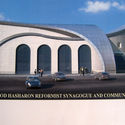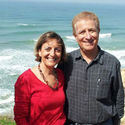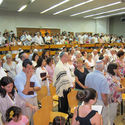They have come-it's time to build
It was bashert – meant to be – that fateful day when Lori and Moshe Erlich happened upon Rabbi Michael Boyden and his wife as they were taking a walk in their hometown, Hod Hasharon, Israel. Earlier that day, Lori read an article about a synagogue in Raanana the rabbi had raised money to build in memory of his son only to have it snatched from his grasp at the last moment.
At that time, Lori promised him if they reached their dream of having a permanent home for a Reform/Conservative congregation in Hod Hasharon, it would bear his son's name.
It is no small task to construct a building for a Reform congregation in Israel. For one thing, in Israel, even though there are some Reform and Conservative synagogues, the only Jewish religion recognized is Orthodox Judaism. And unlike Orthodoxy, Reform and Conservative institutions are not supported financially by the Israeli government. In Hod Hasharon there are 60 Orthodox synagogues on public land but NOT ONE Reform/Conservative synagogue.
"That is why it is so important to us to establish-with a building-the existence of a non-Orthodox congregation in our city," said Lori.
However, this challenge is not daunting to the Erlichs, and Rabbi Michael Boyden, who 12 years ago founded the Reform congregation Kehilat Yonatan that has seen the likes of 4,500 people meet together for Shabbat services, High Holiday services, educational and cultural events and currently has 1,300 connected families in Hod Hasharon, a city of about 50,000. These meetings and services are held in rented facilities and they have a vision to build a permanent facility that will house this growing congregation, as well as the Sharon Center for Jewish Studies that hosts a weekly lecture series on Jewish themes led by authors and artists such as Amos Oz and Haim Beer. This education, cultural center and synagogue will open the doors to religious pluralism in Hod Hasharon-enabling secular Israelis to connect with their Jewish heritage, and encourage deeper bonds between Israeli and Diaspora Jews. They have the people, they need to build the facility to house everything.

Last June, a small crack in the door to fulfilling this dream opened when the mayor of Hod Hasharon granted 20,000 square feet of public land to Kehilat Yonatan to build their center. However, Kehilat Yonatan must come up with $30,000 and architectural plans by December or the city can withdraw their offer. Then, by next June they must show that the entire amount needed to begin building is available for use, that's an estimated $2-$3 million for a sanctuary, social hall, classrooms for adult education and a preschool.
In Hebrew, Lori explained, Reform is called Progressive, and the services feel more like a Conservative service in America-a little more traditional.
"There is a Conservative congregation here, they call themselves Traditional!" Lori said.
Unlike in America where Judaism can be expressed in so many forms, Israelis see Jewish life as two poles-secular or religious (Orthodox).
"Stop an Israeli on the street not wearing a kippah and ask him 'Are you a Jew?' and he will say 'Yes.' Ask him if he observes services or keeps kosher, and he will say 'No.' Then why are you a Jew? His answer is 'Because I'm Israeli. I was born a Jew,'" Moshe explained.
As soon as Progressive came those who called themselves secular were introduced to Jewish traditions they'd never experienced before.
When Kehilat Yonatan held its first High Holiday services back in 2001, there was standing room only. With the Gaza conflict going on, the Erlichs were shocked at how many people came to services to say prayers for Israel and to receive spiritual strength to help relieve the stress everyone was experiencing.
"Had we not started Kehilat Yonatan they would not have anywhere to go," Lori stated. "To me, that says it all. We've given a spiritual pluralistic home to Jews who otherwise wouldn't have it."

With the Gaza conflict and the ever-sounding red sirens throughout the country –including Hod Hasharon, which is just 10 miles north of Tel Aviv, fundraising efforts were put on a back burner.
Realistically, Kehilat Yonatan congregants can raise about $100,000. Lori said they hope to receive 90 percent from overseas donors. "We hope to raise some of this from major donors in Israel. However, this has never been undertaken by any Reform or Conservative congregation before," she stated.
How does this major undertaking affect Central Florida? Many in the Jewish community remember Lori as Lori Stein, daughter of Arnold and Nira Stein. The family was active in the Jewish community and Congregation of Liberal Judaism, as it was called then, where her father served as president for many years. Nira owned The Source, the only Judaica shop in the area (other than the gift shops in each synagogue).

Lori and Moshe were recently here in Central Florida to celebrate her parent's 60th wedding anniversary, not on a fundraising trip. However, a meeting with Rabbi Engel at CRJ, led to a meeting with The Heritage where she shared her Israeli communities' need for a building.
"We haven't started fundraising and I don't know how to do it because in Israel the focus is on the IDF. However, if we don't get this thing off the ground, our social existence is going to go away," implored Lori. "We believe there should be a place where Jews in Diaspora can come to Israel and feel there is a place they can relate to."
Growing up, Lori and her family made three trips to Israel to visit Nira's family. During the second trip, when Lori was 12, she knew Israel was where she wanted to make her home.

"I was a little girl, but I knew this was my place," she said. "I felt immediately at home." On a walk out and about at midnight during that trip, her dad asked her "How do you feel?"
"Great!" she responded.
"Have you ever been outside at midnight?" he inquired.
"Nope."
"Why not? Don't you feel scared?" he asked.
"No. It just felt right." Lori told him. And even now she feels safe-maybe even more so she said. "That's my place and where I belong and that's why I need to do everything in my power to see that Kehilat Yonatan has a permanent home."
Lori attended the Alexander Muss High School in Israel when she was 16. She returned to the states and went to Florida State University and spent her junior year at Tel Aviv University where she met Moshe.

"I was following feet (shadowing), and Moshe thought I was trying to pick him up! So we started dating and 10 months later we came here and he asked my dad for my hand and we're still dancing today!" Lori said with a laugh.
They were married at CLJ where the singing duo, Bob and Annetta sang "Eretz Israel Yafah," (a very popular Israeli dance and song) for their first dance as man and wife.
In 1983, Lori and Moshe moved to Israel where Lori got her master's degree at Tel Aviv University in marketing. She'd received her bachelor's at FSU in economics and international affairs.
In 1994, Lori was sent by the State of Israel as a Schlicha (emissary) to Atlanta for three years where she was responsible to facilitate Aliyah and education about Israel for five states in the Southeast region. The third year, she worked with Hadassah to help facilitate Young Judea programs for kids in 11 states in the Southeast.
Upon returning to Israel, Lori became dean of students at her alumni, Alexander Muss High School in Israel, which is based in Hod Hasharon.
Growing up, Lori always related to synagogue life. In Israel though, since everything is Jewish – the language, food, culture, history, people-she thought she didn't need synagogue. However, she soon realized something was missing. She helped establish Beit Daniel, a Progressive congregation in North Tel Aviv named for Gerald and Ruth Daniels of Sarasota, Fla. The mayor of Tel Aviv, a forward thinking man, gave public land for that synagogue and due to the generous donation of the Daniels, a building was built for Beit Daniel.
Rabbi Michael Boyden came to Israel from Manchester, England. His son Yonatan was 12 years old when they made Aliyah and later served in the Israel Defense Force. He was killed in action in Lebanon. Kehilat Yonatan was named in his memory.
Rabbi Boyden had already founded a Progressive congregation in Raanana, and he had gotten public land and raised the money to build. The last donor though, insisted on their donation being a named donor and dropping Kehilat Yonatan. The congregation board agreed to scrap Yonatan. Boyden was devastated and walked away from the project.
The Erlichs and Boydens knew each other only casually. They met through activities in the Reform movement and both lived in Hod Hasharon, but didn't associate on a regular basis.
One Shabbat morning, Lori was reading an article about the Reform congregation that Rabbi Boyden founded and then lost because he wanted to honor his son's name. "That broke my heart," she said. "As if it wasn't enough that he lost his son and then that last little bit of donation took off the name." She shared the article with Moshe. After lunch, they decided to take a walk.
And this is was how it all started. In this town of 50,000 people, they ran into each other. "Micky!" Lori called out to him in the name people in Hod Hasharon knew him by. "This is bashert! I just read the article. I'm flabbergasted by what I read. Why don't we start a Reform synagogue here in Hod Hasharon and see if we can't get it off the ground?" And then Lori told him "I promise you if we reach our dream of having a permanent home for the congregation in Hod Hasharon, I promise that it will bear the name Kehilat Yonatan."
That next Friday night they held the first minyan in the rabbi's home. "We were surprised to see so many people!" Lori exclaimed. A week later they had the same results with many coming to the service. Rosh Hashanah was just around the corner, so Lori suggested they find a place to rent for the High Holidays to see if there would be enough interest.
The first logical choice was Alexander Muss high school since Lori was the dean of students and the rabbi's wife was also a teacher there. The high school agreed to rent space for their services and to this day they rent the sanctuary in Alexander Muss to hold all their activities.
While renting is a temporary solution to their problem, Alexander Muss' sanctuary isn't always available nor is there always enough room.
"The problem was our activities had grown so much they couldn't always facilitate our requests for lectures and such. So now we had to rent other places within the city," Lori said.
The congregation was spending upwards to 70,000 NS ($19,775) annually on rentals. Whereas the religious ministry in Israel readily gives money to Orthodox congregations, it does not give any money to non-Orthodox groups. "And this is where we are stuck," Lori said.
Ten years ago, after they realized the congregation was growing and they were spending so much money on rental facilities, they turned to the city of Hod Hasharon and requested public land-which the government does without question for the Orthodox community.
"It took 10 years of continual requests and only one year ago we got a grant for public land!"
According to Hod Hasharon's website, there is no synagogue that is not Orthodox in the city but there are nearly 60 Orthodox synagogues listed in Hod Hasharon! Even though they have this congregation and they meet every week, and have holidays and lectures that draw large crowds, Kehilat Yonatan doesn't have a building, therefore they are not considered a synagogue and are not listed on the Internet under Hod Hasharon (they do have a website, http://www.kehilat-yonatan.org).
"There are 4,500 people attending activities annually," Lori stated. "What are they? Friday night services, bar and bat mitzvahs every Shabbat-and sometimes two or three services will be held on one Saturday to accommodate them!"
This is an interesting side step here-In Israel, girls do not have bat mitzvahs.
"Our daughter told her teacher she was having a bat mitzvah, and the teacher had never heard of this!" Lori exclaimed. "She was the first girl in her elementary school to ever have one."
In addition to the lecture series Kehilat Yonatan hosts, they have an Adult Study programs in conjunction with Hebrew University, and a Master's Degree in Jewish Studies in conjunction with Haifa University that has 50 graduates a year.
Kehilat Yonatan's future depends on the ability to raise the money needed to build a permanent home for Reform Judaism in Hod Hasharon. The situation is the reverse of the famous movie "Field of Dreams," in which Kevin Costner's character is told "If you build it, they will come." Well, "they" are there! They just need the permanent building.
When the Erlichs met with Rabbi Engel the idea of twinning Congregation of Reform Judaism with Kehilat Yonatan was discussed. It sounds like a plausible idea that perhaps the congregation board can contemplate. However, in the meantime, the funds need to be raised in full by next June. This isn't just about building a Reform synagogue. It's about shaping the Jewish character of the State of Israel. In a country where all religions-Catholic, Protestant, Greek Orthodox, Muslim-are free to express themselves, it's ironic that only Orthodox Judaism is recognized as the legitimate religion of Israel.
The Erlichs clarified that donors may give named donations. Major naming gifts can be made for the sanctuary and for the entire complex. The wording can be at the discretion of the donor in consultation with Kehilat Yonatan. For information on making a donation or to just learn more about the congregation, contact Kehilat Yonatan, PO Box 3735, Hod Hasharon, Israel or email boyden@kehilat-yonatan,org or visit http://www.kehilat-yonatan.org.









Reader Comments(0)